HR departments are under pressure because hiring in 2025 will be quicker, smarter, and more competitive than before. The days of manually going through hundreds of resumes, scheduling interviews, and sending emails to each applicant are long gone. Accuracy, speed, and a perfect candidate experience are essential for modern organizations.
AI HR tools are changing the game in this regard. These platforms enhance decision-making, automate tedious tasks, and free up HR professionals' time to concentrate on people and strategy. AI is now a crucial component of hiring, from resume screening software that instantly shortlists the best applicants to recruitment automation tools that manage scheduling and communication.
The best part? It empowers recruiters rather than replaces them. AI-adopting teams will hire more quickly, fairly, and intelligently than ever before in 2025.
Table of Contents
What Are AI Tools for HR?
AI tools for HR are smart technologies that streamline difficult hiring processes through automation, natural language processing (NLP), and predictive analytics. In addition to saving time, these tools increase the data-driven and human-centeredness of hiring.
What they can do is as follows:
- Automate candidate sourcing: Find and contact eligible applicants automatically.
- The screen returns in a few seconds: Analyze experience and skills with AI resume screening software.
- Increase candidate engagement by using chatbots and virtual assistants, which are always in communication.
- Forecast the success of talent: Algorithms determine which applicants have the best chance of succeeding.
- Easily integrate: The majority of AI systems have connections to CRMs, ATS, and teamwork platforms.
AI is emerging as the foundation of talent acquisition automation for both startups and multinational corporations. It strikes the ideal balance between technology and empathy, enabling recruiters to work more efficiently while providing candidates with a better experience.
Why HR Teams Need AI Tools for HR in 2025
What is the reason behind HR's increased need for AI? because candidate expectations and the hiring process have evolved. The best talent of today won't wait weeks for generic messages or updates. HR departments need to act fast, interact directly, and make decisions based on facts.
That change is made possible by AI hiring software by:
- Automating manual tasks to cut down on time-to-hire
- assisting in the eradication of unconscious bias in screening
- Providing forecasted information to enhance decision-making
- Increasing the retention and engagement of candidates
Nearly 60% of HR directors currently use AI to improve hiring procedures, and that percentage is growing annually, according to Gartner. AI frees up HR professionals to concentrate on growth, diversity, and culture while the technology takes care of the tedious tasks.
To put it briefly, AI tools for HR are the cornerstone of contemporary hiring, not merely a fad. Employing them helps businesses hire better candidates, not just more quickly.
Comparison Table: 7 Top AI Tools for HR
Here’s a comparative view before we dive deeper:
| Tool Name | Pricing Tier & Trial Info | Key Features / Capabilities | Best Use Case / Audience |
|---|---|---|---|
| Paradox Olivia | Mid-tier, custom quoting | Conversational recruiting, scheduling, candidate chat | High-volume hiring teams, frontline roles |
| HireVue | Premium / enterprise license | Video interviewing with AI analytics, candidate scoring | Large enterprise recruitment |
| Fetcher | Mid-tier / subscription | Candidate sourcing automation, outreach sequencing | Startups, agencies, SMBs |
| Humanly.io | Custom licensing | Interview scheduling, DEI bias tools, chatbot engagement | HR operations, high volume |
| HiredScore | Premium, enterprise-level | Predictive analytics, candidate matching, talent insights | Large enterprises |
| Textio | More accessible pricing, per user | AI writing assistant for inclusive job descriptions | Talent acquisition teams, HR writing |
| Recruitee AI | Mid-level pricing / SaaS | AI sourcing, resume screening, ATS + AI match | Mid-size HR teams |
In the sections below, I describe each tool’s strengths, limitations, and best contexts to use them.
The 7 AI Tools for HR (2025 Edition)
After learning how AI is changing the HR landscape, let's examine the true trailblazers who are bringing about this transformation. The seven most potent AI tools for HR and recruitment in 2025 are listed below; they are all intended to improve the candidate experience, expedite the hiring process, and assist recruiters in reaching quicker, more informed decisions.
1. Paradox Olivia
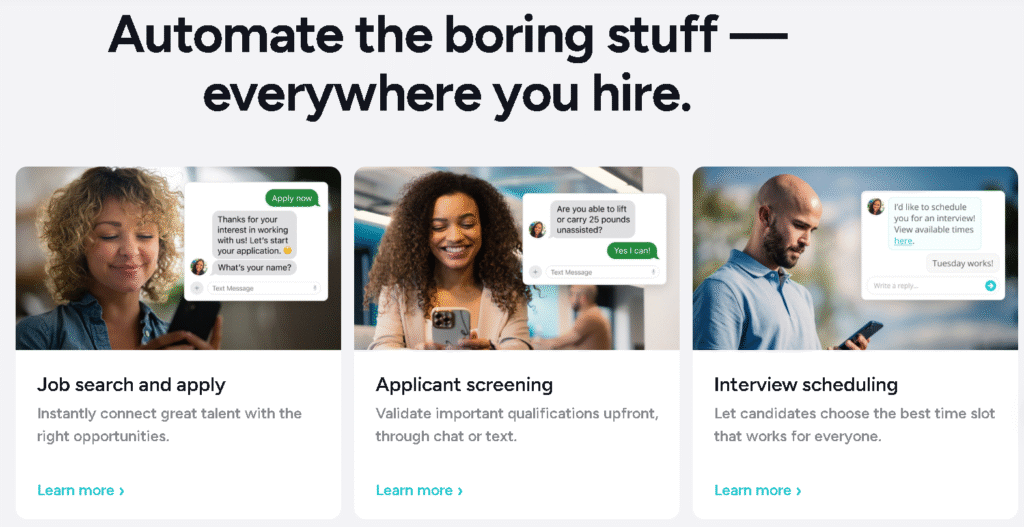
What it is / who uses it
Paradox Olivia is a conversational AI assistant purpose-built for recruiting. It handles candidate communication via chat and SMS, answers FAQs, schedules interviews, and guides candidates through stages. Many high-volume and frontline hiring teams use it to automate first-touch and keep candidates engaged.
Key Features
- 24/7 multilingual chatbot that engages candidates
- Self-scheduling (integrates with calendars)
- FAQs, screening via conversation, follow-ups
- Automated reminders and nudges
Pricing / Trial
Pricing is custom / mid-tier, usually quoted per volume or number of interactions. Many vendors provide demos.
| Pros | Cons |
|---|---|
| Automates communication and scheduling | Requires proper setup to avoid incorrect replies |
| Enhances candidate engagement and response time | Limited customization for niche workflows |
| Integrates easily with ATS and calendars | Mid-tier pricing, may not fit small teams |
Best For
High-volume hiring environments retail, frontline operations, support centers where candidate engagement and drop-off are a big concern.
2. HireVue
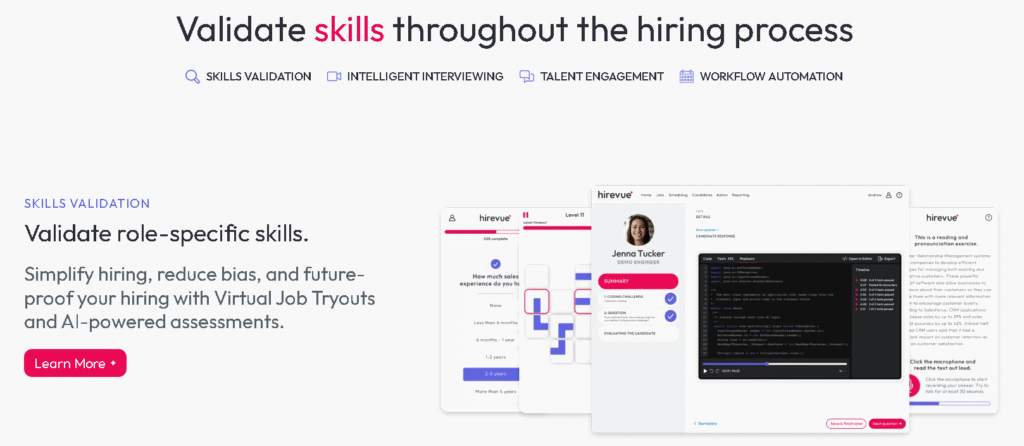
What it is / who uses it
HireVue is a recognized enterprise-level platform that brings AI into video interviewing, assessments, and predictive scoring. Large enterprises often use it for structured hiring at scale.
Key Features
- Pre-recorded and live video interviewing
- AI-based candidate scoring (verbal, non-verbal cues)
- Interview analytics and reports
- Integration with ATS and workflow systems
Pricing / Trial
Premium licensing; pricing typically depends on number of users, interviews, modules. Demos are standard.
| Pros | Cons |
|---|---|
| Scales video interviews efficiently | May feel impersonal to candidates |
| Provides detailed AI analytics on candidate responses | High-tier enterprise pricing |
| Integrates with leading ATS and CRMs | Requires bias and fairness monitoring |
Best For
Large enterprises doing structured interview processes, roles where video interviews are common, or multi-location hiring.
3. Fetcher
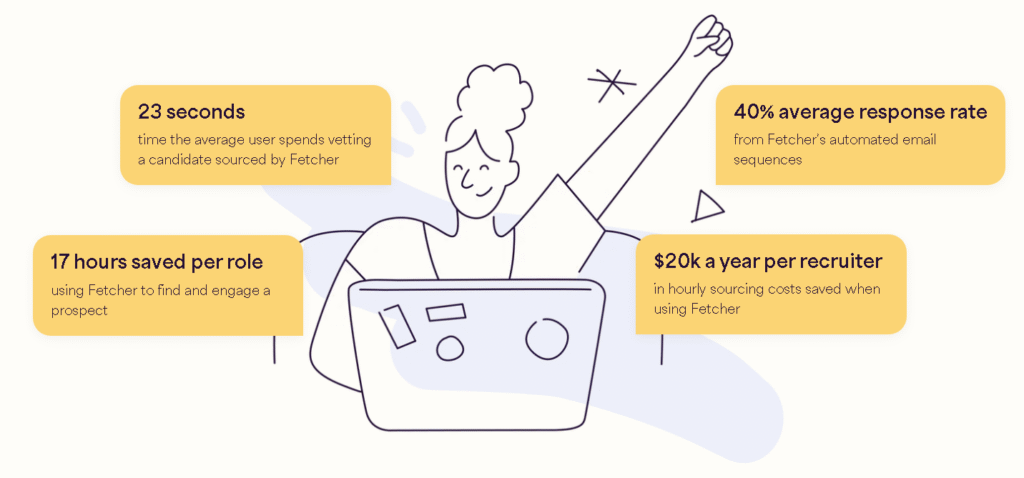
What it is / who uses it
Fetcher is an AI sourcing / outreach tool. It finds candidates that match your role, sequences outreach messages, and surfaces active prospects. It’s often used by recruiters and agencies.
Key Features
- Source candidates across job boards, LinkedIn, etc.
- Automated outreach / email sequencing
- Candidate pool building and filtering
- Reporting dashboards
Pricing / Trial
Mid-tier subscription model; likely per user or per candidate credits. They often offer free trials or pilot periods.
| Pros | Cons |
|---|---|
| Automates candidate sourcing and email sequences | Outreach emails may need manual tone adjustments |
| Improves sourcing efficiency | Can duplicate candidates from public databases |
| Great for small to mid-sized teams | Requires ongoing campaign tuning |
Best For
Startups, agencies, or small recruitment teams that want to grow pipelines and handle outreach more intelligently.
4. Humanly.io
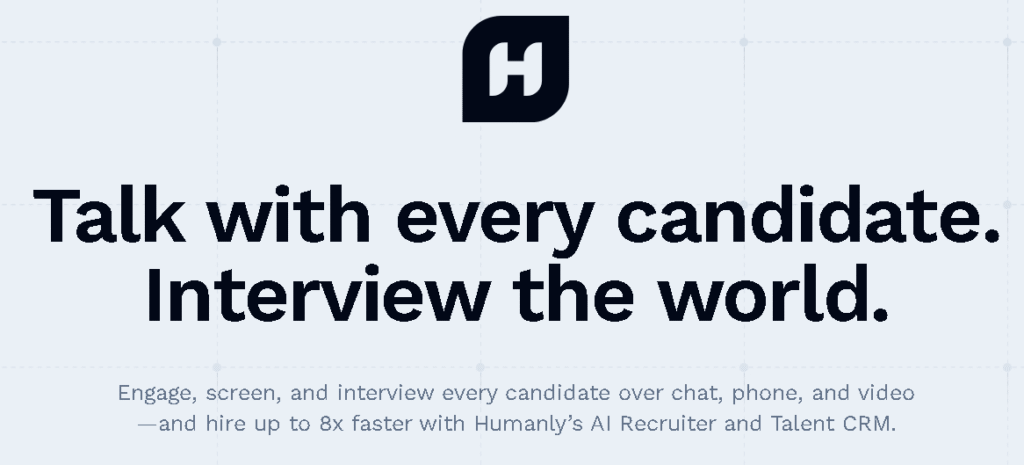
What it is / who uses it
Humanly.io offers AI tools for candidate engagement, interview scheduling, and DEI features to help reduce bias in candidate communication and evaluation.
Key Features
- Conversational chat and candidate messaging
- Scheduling integration (calendars)
- Blind screening / anonymization features
- Feedback automation and candidate follow ups
Pricing / Trial
Custom pricing, depending on scale and modules.
| Pros | Cons |
|---|---|
| DEI-focused candidate screening | Limited advanced analytics |
| Easy to implement with HR systems | Custom integrations may take time |
| Automates scheduling and FAQs | Best suited for SMB to mid-tier teams |
Best For
HR operations teams, organizations that want to streamline candidate communications and scheduling while reducing simple overhead.
5. HiredScore
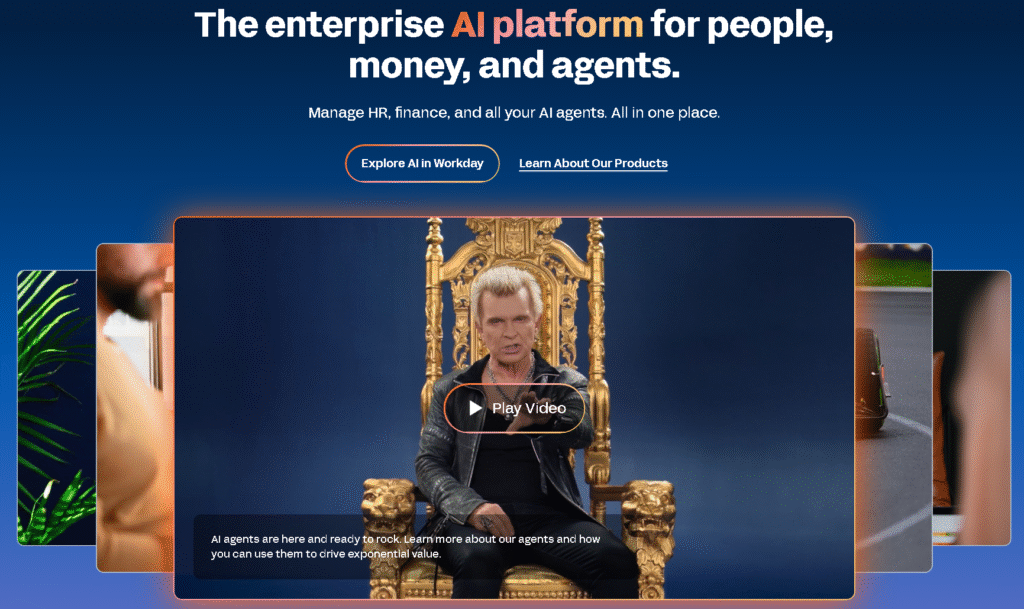
What it is / who uses it
HiredScore operates at the strategic level offering predictive analytics, candidate scoring, and talent insights to large enterprises. It helps you understand which candidates are most likely to succeed, reduce time-to-match, and optimize staffing.
Key Features
- AI-powered candidate scoring and ranking
- Talent intelligence and dashboards
- Predictive attrition and internal mobility insights
- Integration with ATS, HRIS systems
Pricing / Trial
Premium enterprise-level pricing. Often requires a guided pilot or proof-of-concept.
| Pros | Cons |
|---|---|
| Predictive candidate ranking and analytics | Requires enterprise data integration |
| Enhances internal mobility decisions | Not suited for small HR teams |
| High data accuracy and transparency | Premium pricing tier |
Best For
Large enterprises with heavy hiring volume and bandwidth to invest in data infrastructure and analytics.
6. Textio
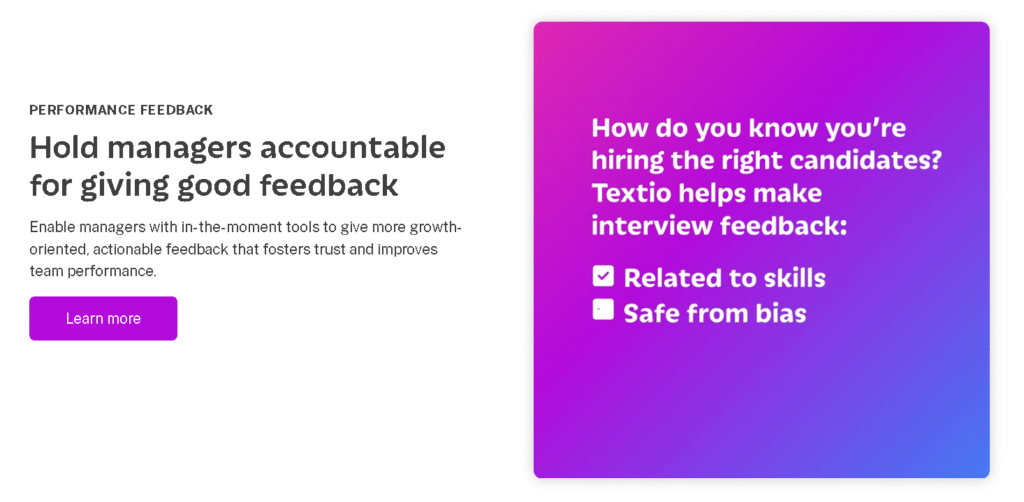
What it is / who uses it
Textio is an AI writing tool tailored to job descriptions and recruitment copy. It helps you craft inclusive, compelling, and high-performing job ads that attract better-fit candidates.
Key Features
- Real-time feedback on inclusive language, bias, tone
- Predictive performance scoring for your job post
- Suggestions and alternatives to improve clarity
- Integrations with ATS or posting platforms
Pricing / Trial
Accessible pricing plans; may include per-user or per-seat models, plus trial/demo offerings.
| Pros | Cons |
|---|---|
| Improves clarity and readability | Not a content generator more of an enhancer |
| Real-time writing suggestions across apps | Sometimes overcorrects stylistic choices |
| Affordable premium plans | — |
Best For
Recruiting teams, talent acquisition writers, and HR teams wanting to polish their job postings and reduce unconscious bias in posting language.
7. Recruitee AI
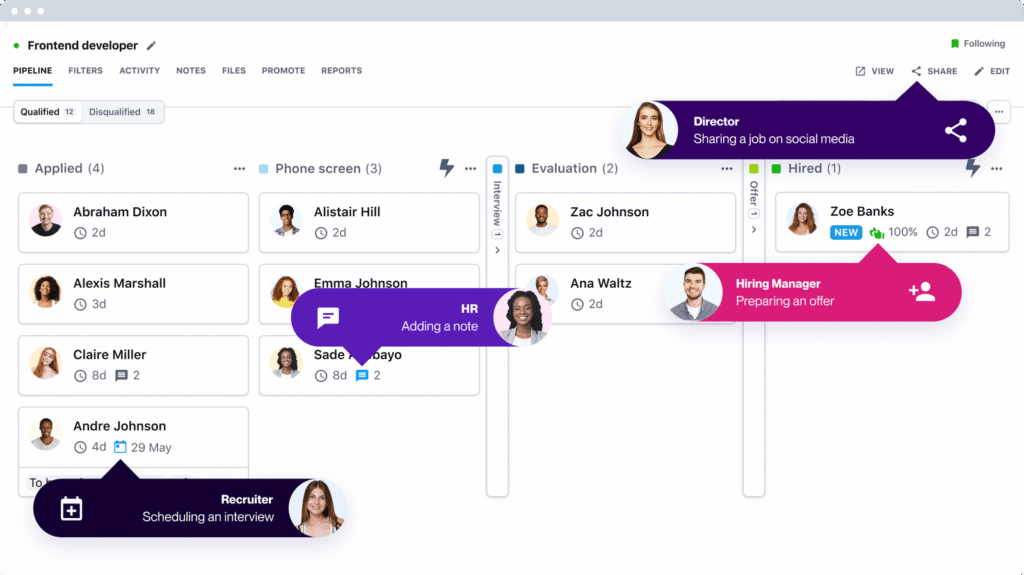
What it is / who uses it
Recruitee is an ATS with built-in AI sourcing and candidate matching capabilities. It combines applicant tracking, AI resume parsing, and candidate sourcing in one platform. Ideal for mid-sized teams that want a unified system.
Key Features
- AI-powered matching and ranking between candidates and job descriptions
- Resume parsing and screening
- Integrated ATS + pipelines
- Sourcing and job board integrations
Pricing / Trial
Mid-range SaaS pricing; often tiered by number of users or job posts. Free trial or demo is commonly available.
| Pros | Cons |
|---|---|
| Unified ATS + AI matching solution | Limited enterprise-scale analytics |
| User-friendly, collaborative interface | Some features locked behind higher tiers |
| Offers integrations with calendars, Slack, and CRMs | Dependent on job data quality |
Best For
Mid-size HR teams that want an “all-in-one” AI-enabled recruiting system without stitching together multiple vendors.
How to Choose the Right AI Tools for HR in 2025
With so many choices, picking the “right” tool can feel daunting. Here’s a guide to help you decide:
1. Define Your Problem / Priority
Are you struggling with sourcing, screening, candidate engagement, interview efficiency, or analytics? Start with the single biggest pain point and choose a tool that addresses it first.
2. Budget & Scale
Startups and small teams often can’t afford enterprise licenses. Tools like Textio or Fetcher may offer good returns with lower upfront costs. Large organizations can invest in platforms like HiredScore or HireVue only if they can realize clear ROI.
3. Integration & Ecosystem Fit
Make sure the AI tool integrates with your existing ATS, HRIS, CRM, calendar systems, and so on. If it doesn’t, you risk process friction and switching costs.
4. Transparency & Auditability (Ethics)
AI is only as fair as its training data. Ask vendors:
- Can you see how decisions are made (explainability)?
- Can you disable demographic signals (anonymization)?
- Are they audited for bias regularly?
5. Ease of Use & Customization
Your recruiters (not just engineers) should be able to use the tool. Overly rigid or complex tools may lead to low adoption.
6. Pilot & Measurement
Run a small pilot: compare performance (time-to-fill, quality, drop-offs) with and without the tool. Make decisions based on data.
7. Long-Term Vision
As your hiring evolves, you may outgrow functionalities. Consider modular tools or those that let you scale up (e.g., adding analytics later).
By mapping your challenges to tool strengths, you minimize risk and maximize impact.
FAQ on AI Tools for HR
Q1: Which AI tool is best for resume screening?
Textio helps you write better job descriptions. Tools like Recruitee AI and HiredScore include built-in resume parsing and ranking capabilities. Fetcher helps source candidates but doesn’t deeply screen as much as parse and score.
Q2: What is the best AI recruitment software for startups?
Start with lighter-cost, high-impact tools: Fetcher for sourcing, Textio for job copy, and Recruitee AI as a combined ATS + matching tool. As you grow, you can layer in analytics or video AI tools.
Q3: Can AI reduce hiring bias in recruitment?
Yes, when used thoughtfully. Tools that anonymize or mask non-relevant attributes, focus on skills, and allow you to audit their decisions can mitigate bias. However, AI systems are only as good as the data they’re trained on. Continuous auditing, human oversight, and vigilance are necessary to catch skewed patterns.
Q4: How much do AI hiring platforms cost?
Costs vary widely depending on scale, features, modules, and enterprise vs SMB pricing.
- Entry-level tools or writing assistants may cost tens to hundreds of USD per user monthly.
- Mid-tier sourcing or ATS tools often work on subscription or candidate-credits models.
- Enterprise analytics, video-analytics, or predictive systems can run into thousands to tens of thousands per year.
Ask vendors for pilot pricing based on your usage metrics (jobs, candidates, interactions) rather than flat quotes.
Conclusion: The Future Is Augmented (Not Replaced)
AI in HR aims to enhance recruiters' abilities rather than replace them. Your team can concentrate on what people do best building relationships, making decisions, and ensuring cultural fit with the help of the next generation of recruitment automation tools, AI-powered talent acquisition, AI candidate matching, and AI employee engagement tools.
HR departments that use intelligent AI tools will have an advantage in 2025 thanks to deeper insights, less bias, quicker hiring, and improved candidate experiences. Strategic tool selection, pilot operations, and constant human oversight are crucial.
Choose the bottleneck that is causing you the most pain (sourcing, screening, scheduling, copywriting, etc.), and then try out one of the seven tools mentioned above. Your next hire can be more intelligent, quicker, and more equitable if you grow into analytics or advanced AI as you gain success.
- Free vs Paid AI Tools (2025): What’s Actually Worth Paying For?
- Top 10 AI Email Automation Tools to Use in 2025
- 10 Best AI Tools for Marketing in 2025
At Tooljunction, we share honest AI tool reviews and tutorials to help you choose the right tools for your creative projects.







